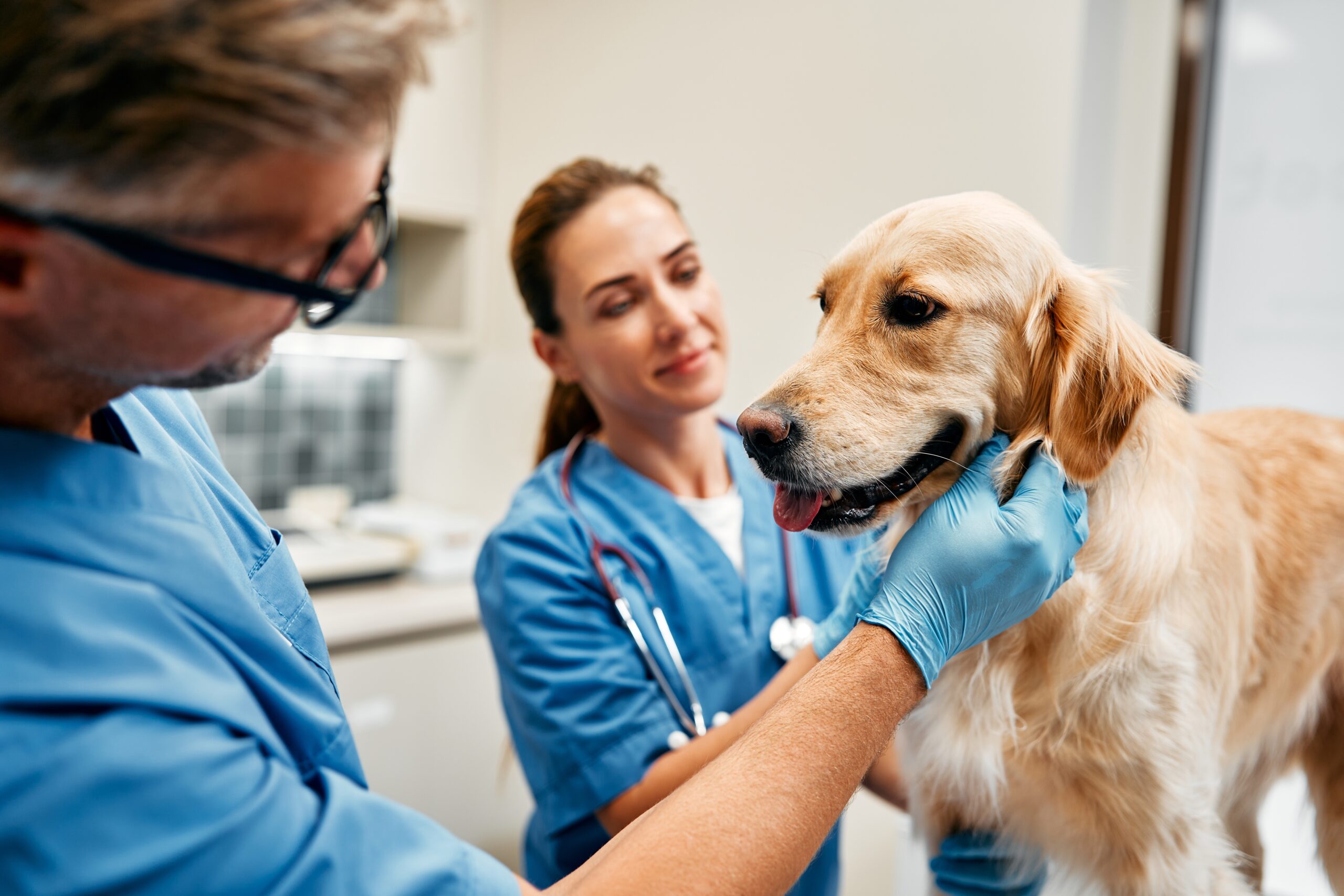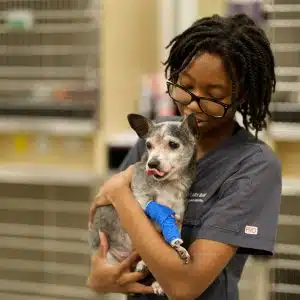How to prepare ahead of your pet’s Pet Cancer Surgery
Wiki Article
Comprehensive Overview to the Providers Provided by a Vet Oncologist
Vet oncology includes a wide array of solutions focused on dealing with and detecting cancer cells in animals. Board Certified Veterinary Oncologist. Oncologists use sophisticated analysis methods and provide numerous therapy choices customized to every pet's needs. They additionally prioritize encouraging care and supply useful resources for pet dog owners. Recognizing these services is crucial for making informed choices. What specific facets of veterinary oncology can significantly influence an animal's treatment journey?Understanding Veterinary Oncology
Vet oncology is a specialized area concentrated on dealing with and diagnosing cancer in pets. This technique includes a vast array of techniques, from clinical treatments such as chemotherapy and immunotherapy to surgical treatments targeted at eliminating growths. Vet oncologists are educated to identify the unique symptoms of cancer in different varieties, allowing them to customize therapy strategies to specific patients.Along with conventional treatments, veterinary oncology emphasizes supportive treatment, which plays a vital role in improving the high quality of life for damaged animals. This includes pain management, nutritional support, and palliative care choices. Partnership with family pet proprietors is critical, as they are indispensable to decision-making concerning their pets' treatment paths. As research developments, vet oncology continues to develop, using new hope and enhanced outcomes for animals detected with cancer. Overall, this area is basic for resolving the intricacies of cancer in companion pets.
Advanced Diagnostic Techniques
Advanced analysis methods play a vital function in veterinary oncology, giving essential understandings right into the presence and level of cancer cells in animals. Imaging modalities such as ultrasound, CT scans, and MRI are frequently utilized to visualize lumps and examine their qualities. Additionally, biopsy treatments are essential for obtaining cells samples, permitting conclusive diagnosis and customized treatment plans.Imaging Modalities Utilized
Imaging methods play a necessary function in the medical diagnosis and administration of cancer in pets. Veterinary oncologists make use of different advanced imaging methods to analyze growth presence, dimension, and metastasis. Radiography, or X-rays, uses an initial view of bone and upper body conditions, while ultrasound provides real-time imaging of soft tissues, enabling in-depth analysis of interior organs. Calculated tomography (CT) enhances visualization of complicated physiological frameworks and enables 3D reconstructions, helping in precise growth localization. Magnetic resonance imaging (MRI) is vital for soft cells distinction, particularly in mind lumps. Additionally, nuclear medication techniques such as positron discharge tomography (PET DOG) help determine metabolic task within lumps. Jointly, these modalities enhance diagnostic precision, leading effective treatment approaches for oncological clients.Biopsy Treatments Described
Adhering to the initial assessment through imaging modalities, obtaining a conclusive diagnosis usually calls for tissue sampling via biopsy treatments. Vet oncologists make use of numerous biopsy techniques based on the tumor's place and features. Great needle desire (FNA) is a minimally intrusive approach that removes cells for cytological exam, ideal for shallow masses. Core needle biopsies supply larger tissue samples and serve for deeper lumps, allowing for histopathological evaluation. Surgical biopsies entail excising a section or the whole growth, assisting in comprehensive assessment. These procedures not only validate the visibility of cancer cells however additionally assist establish its kind and grade, guiding therapy choices. Each biopsy strategy is selected carefully to balance diagnostic accuracy with person safety and security and convenience.Therapy Choices for Cancer Cells in Family pets
When a pet dog is identified with cancer, a selection of therapy choices appear to aid improve and take care of the disease lifestyle. Veterinary oncologists commonly advise a multidisciplinary method customized to the individual family pet's needs, which may consist of surgery, radiation therapy, immunotherapy, or alternative therapies.Surgical procedure is typically used to remove lumps and damaged tissues, potentially bring about complete remission in some situations. Radiation treatment aims to target and destroy cancer cells, lowering tumor size and relieving symptoms - Veterinary Cancer Specialist. Immunotherapy utilizes the family pet's body immune system to eliminate cancer better, while alternative therapies may consist of acupuncture or organic supplements to sustain overall health
Each treatment option brings its very own advantages and threats, and vet oncologists function carefully with pet dog proprietors to design a complete strategy that straightens with the pet dog's specific diagnosis and the proprietor's desires. The best objective is to boost the family pet's convenience and lifestyle throughout their cancer cells journey.
Radiation treatment for Pets
Radiation treatment is an usual therapy choice for family pets detected with cancer cells and is commonly utilized in conjunction with other therapies detailed by veterinary oncologists. This treatment involves the management of certain medications created to target and damage cancer cells, consequently minimizing growth dimension and preventing the spread of the disease. Veterinary oncologists customize radiation treatment procedures based on the kind of cancer cells, the animal's overall health, and the wanted treatment end result.Adverse effects can happen, as these drugs might likewise impact healthy and balanced cells. Usual reactions consist of queasiness, vomiting, and temporary modifications in hunger - Pet Cancer Surgery. Veterinary oncologists are outfitted to handle these side effects properly, making sure the animal's convenience throughout the therapy process. Routine monitoring via blood tests and follow-up consultations is necessary to analyze the pet dog's reaction to radiation treatment and make required changes. Eventually, radiation treatment can offer considerable advantages, improving the quality of life for family pets encountering cancer medical diagnoses

Radiation Therapy in Vet Medication
Radiation therapy functions as a reliable therapy choice for animals diagnosed with local growths, supplying a targeted strategy to cancer management. This technique makes use of high-energy radiation to harm the DNA of cancer cells, preventing their capability to multiply. It is specifically beneficial for lumps that are not responsive to surgical elimination or for cases where surgical procedure might not be practical due to the growth's location.Vet oncologists tailor radiation procedures based upon growth kind, place, and dimension, in addition to the family pet's general wellness. Treatment can be provided via outside light beam radiation or brachytherapy, each with distinct advantages. Commonly, numerous sessions are required to make best use of efficiency while decreasing side effects.
Pets may experience short-term reactions such as skin inflammation, the total purpose is to shrink tumors and minimize signs, inevitably boosting the animal's prognosis and high quality of life. Appropriately, radiation treatment plays a crucial role in extensive cancer cells treatment.
Palliative Treatment and Lifestyle
Palliative treatment in vet oncology concentrates on improving the high quality of life for family pets dealing with terminal diseases, making sure comfort and dignity in their final days. This specialized strategy prioritizes discomfort management, symptom control, and emotional support. Vet oncologists analyze each pet's specific demands, customizing interventions to ease pain and enhance total health.Strategies may include administering drugs for discomfort relief, taking care of nausea or vomiting, and attending to other distressing symptoms. In addition, nutritional support is usually offered to keep toughness and improve hunger. The emotional aspect of palliative care is just as essential; creating a tranquil atmosphere helps lower anxiousness for both animal and owner.
Eventually, the goal of palliative treatment is to allow pet dogs to enjoy their remaining time with as much happiness and dignity as possible. By concentrating on convenience and lifestyle, veterinary oncologists play a crucial duty in making sure that animals and their households navigate this explanation challenging trip with compassion like it and understanding.
Support for Pet Dog Owners During Therapy

Psychological Assistance for Proprietors
Charting the emotional landscape during a family pet's cancer therapy can be an overwhelming experience for proprietors. The uncertainty surrounding medical diagnosis and diagnosis can lead to sensations of anxiety, vulnerability, and sadness. Veterinary oncologists identify the importance of psychological assistance and typically give assistance to aid owners navigate this tough trip. Communication is vital; discussing therapy options and prospective end results can ease some anxieties. Additionally, providing reassurance that emotional actions stand fosters a supportive environment. Lots of oncology facilities might additionally recommend assistance teams or counseling services tailored for animal owners, promoting common experiences. Motivating proprietors to focus on self-care throughout this moment is vital, as their emotional well-being directly influences their pet dog's convenience and total therapy experience.
Resources and Educational Products
Guiding with the complexities of a pet's cancer treatment can be intimidating for proprietors, making accessibility to trustworthy resources and educational products necessary. Veterinary oncologists frequently provide a selection of handouts, sales brochures, and online products that clarify therapy options, possible negative effects, and care strategies. These sources help equip and demystify the procedure animal proprietors to make educated choices. Furthermore, lots of oncology centers provide accessibility to support teams and online forums where owners can get in touch with others facing comparable challenges, cultivating a sense of neighborhood. Educational webinars and seminars conducted by vet professionals additionally enhance understanding, making certain that owners are fully equipped to navigate their family pet's trip with cancer cells treatment with useful source confidence and expertise.Frequently Asked Inquiries
Exactly How Can I Prepare My Pet for a Vet Oncology Visit?
Preparing a pet dog for a vet oncology go to involves event clinical documents, noting signs, and making sure the pet fits. A tranquil disposition and acquainted things can help relieve stress and anxiety throughout the appointment.What Are the Indications My Pet Dog May Have Cancer Cells?
Signs that an animal may have cancer cells consist of inexplicable weight management, relentless vomiting or diarrhea, unusual lumps or swellings, lethargy, modifications in hunger, trouble breathing, and alterations in behavior. Prompt veterinary attention is necessary.Just How Can I Assistance My Pet Dog Emotionally During Therapy?
Sustaining an animal mentally during treatment includes providing comfort, preserving regimens, using mild affection, and making sure a calm atmosphere. Participating in silent play and normal friendship assists relieve stress and anxiety and cultivates a complacency.Exist Alternative Treatments for Pet Dogs With Cancer cells?
Alternate therapies for pets with cancer cells consist of acupuncture, natural therapies, and dietary support. These approaches might match traditional treatments, advertising general wellness. Consulting with a veterinarian is important for safe and reliable assimilation of different therapies.What Prices Should I Anticipate for Vet Oncology Solutions?
The anticipated prices for veterinary oncology solutions can vary considerably, often influenced by diagnostics, treatments, and recurring care. Pet dog owners should plan for expenses varying from assessments to specialized treatments, showing the intricacy of cancer monitoring.Partnership with pet dog owners is crucial, as they are important to decision-making concerning their pets' therapy courses. Each treatment alternative carries its very own benefits and dangers, and vet oncologists function closely with family pet proprietors to develop a thorough strategy that straightens with the animal's details medical diagnosis and the owner's desires. Pets might experience temporary responses such as skin inflammation, the general aim is to shrink tumors and alleviate symptoms, inevitably improving the animal's diagnosis and quality of life. Support for family pet proprietors throughout treatment is important in steering via the psychological difficulties connected with a pet dog's cancer cells diagnosis. Preparing an animal for a veterinary oncology see entails gathering medical records, keeping in mind signs and symptoms, and ensuring the pet is comfortable.
Report this wiki page